Worthy of note
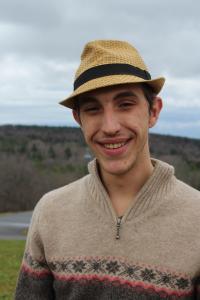 “I had the high honor of serving my country and working as an intern in the American embassy in Berlin, where I had access to the world of diplomats,” said junior Max Barksdale (right). Max worked in public affairs, giving tours to German school groups, writing “extremely unique” memos, and organizing events, including the visit of President Barack Obama and First Lady Michelle. His internship relates directly to his course of study at Marlboro in international relations. “This year I’m taking a class on American foreign policy, which I now have the honor of saying
I have seen firsthand.” See a video he worked on.
“I had the high honor of serving my country and working as an intern in the American embassy in Berlin, where I had access to the world of diplomats,” said junior Max Barksdale (right). Max worked in public affairs, giving tours to German school groups, writing “extremely unique” memos, and organizing events, including the visit of President Barack Obama and First Lady Michelle. His internship relates directly to his course of study at Marlboro in international relations. “This year I’m taking a class on American foreign policy, which I now have the honor of saying
I have seen firsthand.” See a video he worked on.
“I demonstrated that the representation of the African woman as disempowered and victim does not reflect the historical reality of the role of the woman,” said Boukary “Abou” Sawadogo in an interview for the African Women in Cinema Blog. Marlboro’s inimitable French professor spoke to blogger Beti Ellerson about his research on marginal figures in his recent book, Les Cinémas Francophones Ouest-Africains (Potash Hill, Summer 2013). There was also an article about his recent film, Salut Y’all: African Teachers on the Bayou, in the June issue of Francophonie, a publication of the RFI global French language radio station.
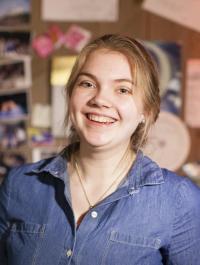 “I am in Spain, specifically Granada, studying the influences of Islam in Europe, so
the Alhambra was fascinating
to me,” wrote junior Amelia Brown (right) in her blog last semester. She traveled to Spain and Morocco through Central College Abroad, with a side trip to Germany to visit relatives. Despite some transportation snafus and other challenges, Amelia has gained valuable experience and perspectives for her course of study at Marlboro. “How often will I have a chance to live in Europe, to travel through Spain? It’s an adventure, and I am glad I came on it, no matter the challenges it has presented.”
“I am in Spain, specifically Granada, studying the influences of Islam in Europe, so
the Alhambra was fascinating
to me,” wrote junior Amelia Brown (right) in her blog last semester. She traveled to Spain and Morocco through Central College Abroad, with a side trip to Germany to visit relatives. Despite some transportation snafus and other challenges, Amelia has gained valuable experience and perspectives for her course of study at Marlboro. “How often will I have a chance to live in Europe, to travel through Spain? It’s an adventure, and I am glad I came on it, no matter the challenges it has presented.”
Philosophy professor William Edelglass gave a series of invited talks this fall, including two in Oregon in October. He spoke at Oregon State and at Maitripa College, in Portland, about contemporary themes at the intersections of Buddhism and ecology. He also moderated two sessions at the international Association for Environmental Philosophy, in Eugene, for which he serves on the executive committee. In September he appeared at Salisbury University, where he presented two talks, one on Buddhist sand mandalas and one titled “Global Climate Change, Social Justice, and Buddhist Ethics.” He also gave a talk at Susquehanna University, in central Pennsylvania, together with one of their professors, on categories of religion and philosophy in non-western thought.
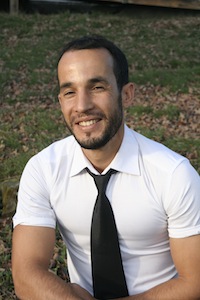 “I am really enjoying every moment here,” said Abdelhadi Izem (right), the Fulbright Arabic Fellow on campus for the 2013–14 academic year. “I am surprised at how fast students learn Arabic; they’re really very motivated.” Abdel, who is from Morocco, received his B.A. in English studies from ibn Zohr University, and has taught English for the past six years at the Hassan ii High School, in Guelmim. He was
a great addition to the soc
cer team, and organized a Moroccan cultural festival in November, including tea, food, and a fashion show. “I am very fortunate that I was placed in Marlboro,” said Abdel. “It is heaven on earth. I love everyone here.”
“I am really enjoying every moment here,” said Abdelhadi Izem (right), the Fulbright Arabic Fellow on campus for the 2013–14 academic year. “I am surprised at how fast students learn Arabic; they’re really very motivated.” Abdel, who is from Morocco, received his B.A. in English studies from ibn Zohr University, and has taught English for the past six years at the Hassan ii High School, in Guelmim. He was
a great addition to the soc
cer team, and organized a Moroccan cultural festival in November, including tea, food, and a fashion show. “I am very fortunate that I was placed in Marlboro,” said Abdel. “It is heaven on earth. I love everyone here.”
“Very few of the new jobs created by construction in Boston’s Chinatown have gone to Chinatown residents, and the library that was torn down in the 1950s has never been rebuilt,” said senior Kara Hamilton. She did a summer internship with the Chinese Progressive Association, a grass-roots community organization in Boston’s Chinatown that is fighting the history of deconstruction and displacement of residents there. She developed materials for a community stabilization march called Tour R Chinatown, and collaborated with high school youth on a small “free library” bookshelf, part of their campaign to bring a library back to Chinatown. “I really valued getting to know the community, and was inspired by their activism—particularly the youth,” said Kara, who is doing her Plan of Concentration in Asian American studies and documentary studies.
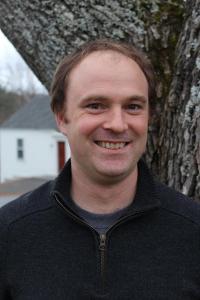 “Koha is just one open source library catalog software that
we use, all of which have saved the college gobs of money,” said Elliot Anders (right),
web developer. Marlboro is also among the first colleges to use software called CUFtS and Godot, and last October Elliot and Amber Hunt (Potash Hill, Summer 2013) were invited to
a Koha conference in Reno, Nevada, to share their experiences. They were also able to connect with people they had been collaborating with for
the past three years. “Our talk was an attempt to excite users of Koha to try out CUFtS and Godot, to hopefully grow the user base and interest some developers in contributing to
its development. The greater the number of libraries using it, the more bugs will be reported and special features requested.”
“Koha is just one open source library catalog software that
we use, all of which have saved the college gobs of money,” said Elliot Anders (right),
web developer. Marlboro is also among the first colleges to use software called CUFtS and Godot, and last October Elliot and Amber Hunt (Potash Hill, Summer 2013) were invited to
a Koha conference in Reno, Nevada, to share their experiences. They were also able to connect with people they had been collaborating with for
the past three years. “Our talk was an attempt to excite users of Koha to try out CUFtS and Godot, to hopefully grow the user base and interest some developers in contributing to
its development. The greater the number of libraries using it, the more bugs will be reported and special features requested.”
This fall, ceramics professor Martina Lantin curated a show titled “Disaster, relief, and resilience,” featuring the work of more than 50 artists from across the United States and hosted by the Crimson Laurel Gallery in north Carolina. “The unique aspect of this show is that the artists and the gallery are donating some of the proceeds to benefit the Craft emergency relief Fund (CerF),” said Martina. Based here in Vermont (and employing alumna Carrie Cleveland ’02), CerF provides financial support for artists and craftspeople whose livelihoods have been affected by natural disaster or personal tragedy.
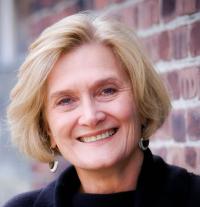 In October, Beverly Burkett (right) was a featured speaker at the international KOteSOL (Korean teachers of English to Speakers of Other Languages) conference in Seoul, South Korea. The degree chair for Marlboro’s master’s program in teSOL, Bev gave a presentation titled “Developing a personal theory of teaching practice: the role of reflection.” “The conference theme, Exploring the Road Less Traveled:
From Practice to Theory, really resonated with me because
it aligned with our approach here at Marlboro,” said Bev. “We begin with experience and a focus on our practice and theorize from that. Of course, the title brought to mind Robert Frost’s poem
‘The Road Not Taken,’ and, given his connection to the founding of Marlboro, that was an added attraction.”
In October, Beverly Burkett (right) was a featured speaker at the international KOteSOL (Korean teachers of English to Speakers of Other Languages) conference in Seoul, South Korea. The degree chair for Marlboro’s master’s program in teSOL, Bev gave a presentation titled “Developing a personal theory of teaching practice: the role of reflection.” “The conference theme, Exploring the Road Less Traveled:
From Practice to Theory, really resonated with me because
it aligned with our approach here at Marlboro,” said Bev. “We begin with experience and a focus on our practice and theorize from that. Of course, the title brought to mind Robert Frost’s poem
‘The Road Not Taken,’ and, given his connection to the founding of Marlboro, that was an added attraction.”
In June, Spanish language and literature professor Rosario de Swanson presented a paper in Portugal, at the Universidad Fernando Pessoa. Her paper was part of a symposium on Mexican literature organized by CeiSAL, the European Council for Social research on Latin America. Titled “National Dystopias,” Rosario’s talk centered on the dramatic poems of Mexican feminist Rosario Castellanos.
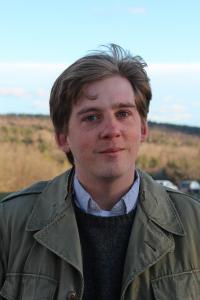 “Marlboro’s a very interesting place,” said Sean Harrigan (right), Marlboro’s Classics Fellow for the academic year. “My classes are fun, and I enjoy the way tutorials bring me into contact with things I wouldn’t necessarily be reading or thinking about if left to my own devices.” Sean completed his doctorate degree in classics from Yale in May, and has taught both Greek and Latin. His research focus is on the poetry of Archaic Greece, specifically how it was performed. “The fact that our texts survive as ink on paper obscures the amazing reality that what we tend to call poetry is almost always better thought of as song. I’m especially interested
in songs that were performed
as part of religious ceremonies, where the words may tell us something about the rituals in which people were taking part.”
“Marlboro’s a very interesting place,” said Sean Harrigan (right), Marlboro’s Classics Fellow for the academic year. “My classes are fun, and I enjoy the way tutorials bring me into contact with things I wouldn’t necessarily be reading or thinking about if left to my own devices.” Sean completed his doctorate degree in classics from Yale in May, and has taught both Greek and Latin. His research focus is on the poetry of Archaic Greece, specifically how it was performed. “The fact that our texts survive as ink on paper obscures the amazing reality that what we tend to call poetry is almost always better thought of as song. I’m especially interested
in songs that were performed
as part of religious ceremonies, where the words may tell us something about the rituals in which people were taking part.”
Or for the most up-to-date scoop, see:
Potash Phil cosmo.marlboro.edu/potashphil
Facebook www.facebook.com/marlborocollege
Youtube www.youtube.com/user/marlborocollege
twitter www.twitter.com/marlborocollege
